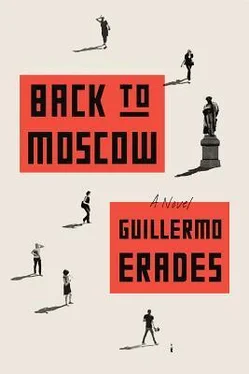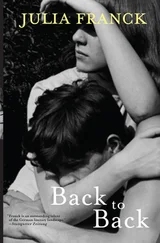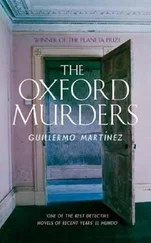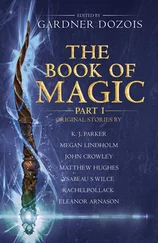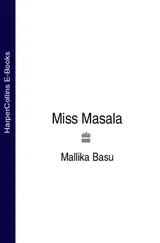‘What about God?’ I said. ‘You know, the all-powerful creator.’ I extended my arm and grabbed the New Testament from the pile of books on her bedside table. ‘The God from your Bible.’
‘There is no God,’ Lena said. ‘The Bible is a beautiful fairy tale — a skazka.’
‘Why do you wear the cross then?’
‘You don’t need to believe in God to be a good Christian.’
I dropped the New Testament next to the pillow, leaned over Lena’s body, kissed her stomach, then her breasts. ‘A good Christian?’ I said.
Lena burrowed her fingers in my hair. ‘I believe in the values of Christianity as preserved by the Russian Orthodox Church. I believe in forgiveness, in compassion, in resurrection.’
My tongue was now toying with her nipples. ‘If you ask me,’ I said, looking up, ‘I find resurrection the weakest part of the Gospels. You know, coming back from the dead. Bit of a stretch, don’t you think?’
‘You shouldn’t mock this,’ Lena said, now placing her hand over the New Testament. Like most of her books, the volume was encrusted with plenty of bookmarks. ‘It gives my life a sense of direction. Trying to be good is a daily struggle.’
I kept playing with her breasts.
‘Resurrection,’ she continued, ‘is of course a metaphor. Flesh is flesh, when it dies, it dies. But a dead soul can return to life. Bad deeds can be redeemed.’
My lips caressing her skin, I glanced up at her face. ‘What about Yeshua?’
‘Yeshua?’ she said.
‘Christ, you know, Jesus. Yeshua, like in The Master and Margarita .’
‘I think the Gospels are beautiful.’
‘But you can’t believe they actually happened.’
‘I don’t. The New Testament was written by men. But I think Christ, the historical figure, must have been an incredible man who walked the Earth with a beautiful message. I believe in the message.’
Trying to keep her exact words in my head, I turned over and reached for my red notebook. These were the kind of thoughts I could find a use for in my research.
‘Leave your notebook,’ Lena said. ‘Please.’
Lena didn’t like my notebooks. When I began carrying them around, I’d tried to explain how it was important for me to understand her way of seeing the world so that I could compare her views with those of literary heroines. I’d thought she would feel proud to be useful, to take part in my research. But instead, she had developed an unexplained aversion towards my notebooks, and I could feel, every time I took one of them out of my backpack, that she didn’t appreciate my taking notes.
‘I just want to write something quickly,’ I said, looking for a blank page.
With sudden violence, Lena ripped the notebook from my hands, and threw it into the air. The red notebook flew across the room, hit the wall, and landed on the other bed, next to a pile of dirty clothes.
I didn’t know what to say.
‘Martin, right now you are with me.’
It was often the case that I couldn’t make much sense of Lena’s actions. I decided to let it go and move on. I kissed her lips, caressed her hair, and tried to continue with our conversation.
‘I don’t think you need any bible to tell you what’s good and what’s bad,’ I said. ‘If you are a good person, you don’t need religion.’
‘And how do I know I’m a good person?’
‘You are,’ I smiled. ‘Trust me.’
‘I don’t know if I’m a good person, really. That’s why I need to search.’
‘Search for what?’
She didn’t answer.
I pushed my body against hers, kissed her neck, her ear. She didn’t react. Her eyes were moist.
‘For chrissake, Lena, why can’t you just enjoy life as it is?’
‘Because,’ she said softly, ‘without the search, life is a lonely and meaningless thing.’
Those were her exact words — a lonely and meaningless thing. I know because, later that night, I wrote them down in my mistreated notebook.
And now, so many years later, the smell of incense still brings me back to Lena’s room in the kommunalka — the piles of clothes, the old bed, the worn books — and I feel an emptiness in my chest because life since hasn’t been anything like so complete, so full of promise, so void of pain, and, even if I didn’t know it, back then I could extend my arms, reach out, and almost touch happiness.
IN 1900, ANTON PAVLOVICH Chekhov, by that time very sick and living in Yalta, wrote a play about three sisters who were stuck in a provincial shithole and spent their days dreaming about moving back to Moscow. Three Sisters: A Drama in Four Acts is not a story of sweeping mad love or tragedy. It’s about boredom and dullness and the futility of pursuing happiness.
Olya, Masha and Irina live in a small town, absorbed in the insignificant tasks of daily life, watching time pass by, reminiscing about a happier past and dreaming about a brighter future. For the three sisters, who feel they don’t belong in the provinces, there is only one way out of their dull existence: Moscow.
Moscow is the place where they could be happy again.
The three sisters, each in their twenties, had left Moscow eleven years earlier, when their father — a general, now dead — had been awarded the command of a regiment in the provinces. They have a brother, Andrey Sergeyevich, who plans to return to Moscow to become a university professor, taking his sisters with him.
At the beginning of the play, Irina, the youngest, is radiant and hopeful. While her older sisters can’t help being moody, Irina’s dreams infuse her naive soul with endless optimism. It’s in Moscow, she believes, that she will find true love and they will all be happy.
To the great disappointment of the three sisters, their Moscow plans never seem to take off. As the play advances and the sisters begin to understand that they might be stuck in the provinces, Moscow becomes less real, more ethereal. A spiritual aspiration.
Moscow represents where they want to be, both the past and the future. Moscow is everywhere, except here and now.
In Three Sisters , Anton Pavlovich exposes the very human weakness of believing that both the past and the future are better places to be. And holding on to the illusion that things will get better is our way of coping with life’s dullness.
A series of visitors, mostly military officers from the battalion in town, come to see the three sisters. Among them is Vershinin, a colonel, who at the beginning of the play has just arrived from Moscow and impresses the sisters with his sophistication.
Masha, the second sister, married at eighteen, is now bored of her husband. Whining about her life, she says that if only she lived in Moscow she would not even care about the weather. In response, Vershinin tells her the story of a French political prisoner who writes with passion about the birds he sees from the window of his cell, the same birds he never noticed when he was a free man. In the same way, Vershinin tells Masha, you will not notice Moscow once you live there again. We want happiness, he concludes, but we are not happy and we cannot be happy.
Masha, deeply impressed, starts an affair with Vershinin.
Irina talks about finding meaning in life through labour. But when she starts work at the local telegraph office she realises her life has no more meaning than before. Time goes by and Irina, too, loses her spark, drifting into ennui. As the dream of Moscow evaporates, she accepts her sudba and agrees to marry an officer she doesn’t love.
At one point, Masha realises that she can hardly remember the face of her dead mother. Their own mother, who died young and is buried in Moscow, is being forgotten. And we will all be forgotten one day, Masha says. Yes, Vershinin replies, they will forget us. That’s our destiny, our sudba: things that we believe serious, meaningful, very important, there will come a time when they will be forgotten or will seem unimportant.
Читать дальше
